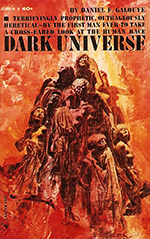
![]() couchtomoon
couchtomoon
11/13/2014
![]()
We associate "living in a cave" or "living in the dark" with being synonymous with ignorance. The very root of the term "enlightenment" describes the absence of darkness, the illumination of visual space. With Daniel Galouye's Dark Universe (1961), this use of language and its semantic consequences is brilliantly illustrated in his post-apocalyptic universe of what-ifs and because-ofs, where didactic religious thought winds up on the receiving end of some severely direct criticism.
But to fully appreciate this post-apocalyptic classic, one must be familiar with Plato's "Allegory of the Cave." You can find an exact version here, an illustrated version here, or you can check out MY version here. (Warning: MY version may not be entirely accurate.)
Jared and his community of Survivors live in a network of caves and tunnels deep underground. Because his ancestors have lived in these dark burrows for so long, he and his people are not aware of their own sense of vision. Another clan, with whom they share tense relations, lives in the upper level of the caves, and both clans rival "the Zivvers," a strange people who have the ability to sense objects by "zivving." The caves are also haunted by "the Monsters," who kidnap people, and can somehow navigate the caves by hurling a mysterious "noise" ahead of them. Jared's people live in a tenuous existence of constant fear, and their only hope is through their faith that they will someday be saved by the "Great Light Almighty," even though they aren't really sure who or what that is.
A literal Plato's cave, Galouye's tale does a better job of exemplifying the Greek philosopher's point. The post-apocalyptic setting provides for a more believable premise, without the need of chains and puppet masters. Jared's people are perfectly adept at imprisoning themselves, and casting their own metaphorical shadows on the walls--rationalizing their reality as they see it... or rather, as they don't see it.
Language is the pre-cave holdover that confuses things, a completely believable linguistic evolution considering our current usage of these words. The terms "light" and "dark" have morphed to become abstract theological concepts, and Jared's people equate "Light" with god, truth, and redemption, and darkness with–, well, "You don't find Darkness. You commit it" (p. 5). "Radiation" is the preferred curse word of these underground dwelling people, while a familiar mythology surrounds the demons called "Cobalt" and "Strontium," providing a hint of what led to this buried civilization. Even Galouye's prose, despite its initial pulpy appearance, yields world-building efficiency with his clicks and clacks and thuds and tinkles.
Galouye pays great attention to a world in which people are unaware of their potential visual capabilities, though his stereotypic leaps about blindness might offend people who are better familiar with the lifestyles of the visually-impaired. Jared's people scope their dark surroundings through their heightened senses of hearing, smelling, and feeling vibrations. They click pebbles in order to "hear" where they are going, and they maintain large echo casters to make auditory composites of large spaces. They hear smiles. They listen AT each other. And when Jared is finally introduced to Light, Galouye does an excellent job of describing visual data from the point of view of someone who cannot comprehend it. Visual perceptions become "psychic pressure" (p. 42) and "screaming silence" (p. 66), and "crazy shouts that kept bouncing against [his] face" (p. 60).
And even Galouye's small bits of humor add deliberate impressions of Jared's world. At one point, we are reminded that "crossing the Barrier is the worst possible offense, besides Murder and Misplacement of Bulky Objects!" (p. 22). Very Pratchett-esque, but given its surprising delivery, this might be one of the funniest lines in SF ever.
But Dark Universe is a novel from the early 1960's, the same year that we also get Heinlein's sexy cheese fest Stranger in a Strange Land. Expect no feminism here. The two female characters are annoying, jealous airheads. And at one point, Jared "wondered whether a few swats in the right place wouldn't soften her tongue" (p. 31). Fortunately, these moments don't happen often, and this is to be expected in early 60's sf (although it doesn't happen as often as you might think). Be wary.
For a narrative that parallels a more famous narrative, one might expect a dull read, but it's captivating to follow Jared on his mission to find Truth, by way of hunting evil, despite the risk of blasphemy and ostracization. Do we know where this is going? Yes, we know where this is going. But we don't know from where Jared is coming. It's not Jared's adventure that's most interesting, or even Galouye's not-so-subtle philosophizing, but the puzzle of Jared's current experience. The fun is in decoding Galouye's phraseology to shed light on the lives of Jared's people.
It's surprising that Dark Universe has not received more accolades. It has all of the trademarks of a more properly hailed SF novel and, in the pompous, not so humble opinion of this reader, should be classified as an SF Masterwork. To expect dry SF pulp and receive cutting commentary in a fully-realized world, filled with lively word play is a pleasant surprise. AND, he does it better than Plato.
One of my favorite reads of the year! Recommended for SF completionists, religious critics, language lovers, philosophy fans, and spelunkers. Oh hell and radiation! I recommend this to everybody.
http://couchtomoon.wordpress.com